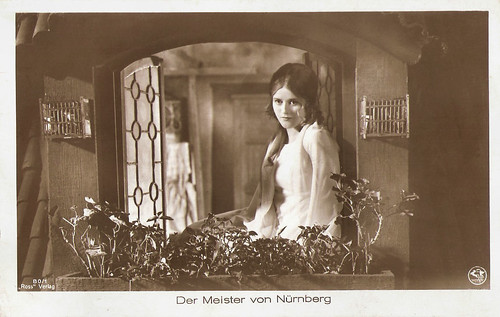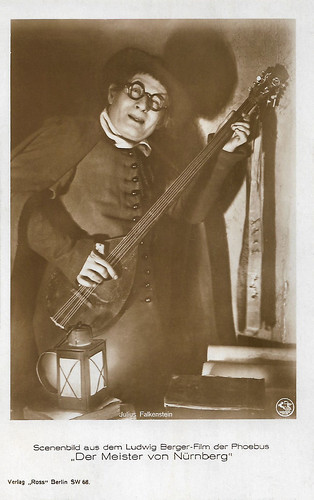
German postcard by Ross Verlag, no. 80/1. Photo: Phoebus-Film, Berlin. Maria Solveg in Der Meister von Nürnberg/The Master of Nuremberg (Ludwig Berger, 1927).

German postcard by Ross Verlag, no. 80/2. Photo: Phoebus-Film, Berlin. Maria Solveg and Rudolf Rittner in Der Meister von Nürnberg/The Master of Nuremberg (Ludwig Berger, 1927).

German postcard by Ross Verlag, no. 80/3. Photo: Phoebus-Film, Berlin. Gustav Fröhlich and Maria Solveg in Der Meister von Nürnberg/The Master of Nuremberg (Ludwig Berger, 1927). Collection: Geoffrey Donaldson Institute.

German postcard by Ross Verlag, Berlin. Photo: Phoebus Film. Veit Harlan and Julius Falkenstein in Der Meister von Nürnberg/The Master of Nuremberg (Ludwig Berger, 1927).
Reminiscent of the old woodcuts of a Dürer
In Der Meister von Nürnberg/The Master of Nuremberg (Ludwig Berger, 1927), the respected town clerk Beckmesser (Julius Falkenstein) wants to marry the daughter of the goldsmith Veit Pogner (Max Gülstorff), Evchen (Maria Solveg). But she can't stand the baldy and therefore makes the proposal, which at first sight seems highly implausible, to marry the much older master shoemaker Hans Sachs (Rudolf Rittner).
The old man has been in love with the pretty Eva for some time and agrees to the idea with great joy, considering himself her groom already. The Master of Nuremberg faces stiff competition from his apprentice (Gustav Fröhlich), whose real name is Walther von Stolzing and who comes from a good family. He, too, has his eye on the good bourgeois daughter.
Like the girl, Walther also wanted to avoid an unwanted marriage. When he tries to elope with Evchen Pogner, he is arrested. A poetry competition is held to decide who will be allowed to marry Evchen. Hans Sachs wins the poetry competition but leaves his poem to the young Walther when he realizes that he and Evchen belong together.
The Österreichische Film-Zeitung wrote at the release of the film in September 1927: "Hans Sachs has been taken out of the bland craftsman's atmosphere and made the center of the whole film. He is not so much the coarse, honest master shoemaker, but an even more skillful communal diplomat who weaves threads of love along the way. (...) Director Berger is characterized by a very healthy sense of humor. (...) He has given Stolzing the face of a cheeky rascal, and Evchen is quite a rascal. The gentlemen of the council seem to come from Schilda, Beckmesser does not have the tragic undertone as in Wagner but is a fool in love, and through the scuffles as well as through the council negotiations there is from time to time an effervescent, but at least always inwardly gurgling laughter. Rudolf Rittner, whose Hans Sachs is an almost splendid figure, excels in the performance."
Oskar Kalmus wrote in retrospect in his 'Zum Werden deutscher Filmkunst' (1935): "It will always be a difficult experiment to film Richard Wagner. Of course, even a director as clever as Ludwig Berger knew that. That is why his film The Master of Nuremberg (1927) was almost not based on Wagner's opera at all. For his film, he rejuvenated Hans Sachs and placed Walther Stolzing more broadly in the plot in order to create a folk play in the sense of both the Middle Ages and modern times. The whole pictorial design is therefore much reminiscent of the manner of the old woodcuts of a Dürer and the decorations of the Spitzweg manner. The actor Rudolf Rittner stands out as the Master of Nuremberg, and Maria Solveg as Eva."
However, the film was considered artistically unsuccessful because of its overly theatrical presentation. After completing the film, director Ludwig Berger emigrated to work in Hollywood, although he returned in the early 1930s to Germany. After the rise of the Nazis, Berger worked in France, the Netherlands, Great Britain, and after the war again in Germany.

German postcard by Ross Verlag, Berlin. Photo: Phoebus Film Julius Falkenstein in Der Meister von Nürnberg/The Master of Nuremberg (Ludwig Berger, 1927).

German postcard by Ross Verlag. Photo: Phoebus Film. Maria Solveg and Gustav Fröhlich in Der Meister von Nürnberg/The Master of Nuremberg (Ludwig Berger, 1927).

German postcard by Ross Verlag. Photo: Phoebus Film. Maria Solveg in Der Meister von Nürnberg/The Master of Nuremberg (Ludwig Berger, 1927).

German collectors card by Ross Verlag in the series Vom Werden deutscher Filmkunst - Der Stumme Film, picture no. 114, group 39. Photo: Ufa. Publicity still for Der Meister von Nürnberg/The Master of Nuremberg (Ludwig Berger, 1927).
Sources: Wikipedia (German and English) and IMDb.
No comments:
Post a Comment